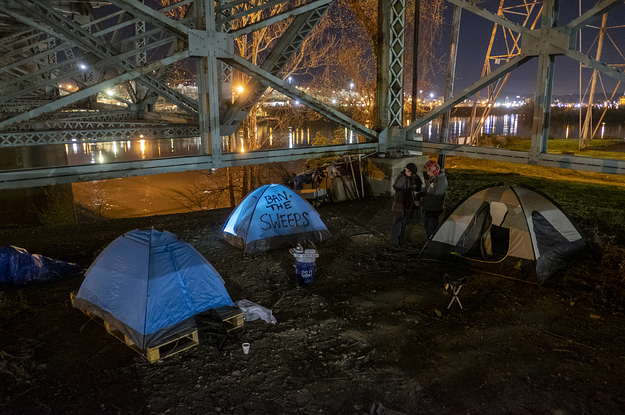CHARLESTON, West Virginia — In the back of St. John’s Episcopal Church, one highway exit down from the golden dome of West Virginia’s Capitol, is a soup kitchen. Anyone can eat there, whether they’re experiencing homelessness or not, and hear about life on the streets and under local bridges.
“Oh, there is police harassment, they take your things,” said Sue Bob White, 53, while sitting at a table in front of a baked chicken lunch in a styrofoam to-go box. A bit of a celebrity from a 2009 documentary on hard living in rural West Virginia, she switched from lamenting a tent lost in a police sweep of an encampment to plans to sell clothes online. “Everyone else is getting rich off me on TikTok, after all.”
White was at the Manna Meal lunchroom with about two dozen other people who needed a meal. People come and go, some missing limbs or in wheelchairs, going outside to smoke, or grab a meal and hurry to a shelter blocks away that briefly offers a chance to shower.
Less than a mile away, a trial is ongoing between three pharmaceutical companies and the state, which alleges that the firms used deceptive advertising two decades ago to hook people on pain pills, starting an opioid crisis that is now the leading cause of drug overdoses nationwide. Here, many of the people on the other end of that story are having lunch behind St. John’s.
“There’s just a lack of hope,” said Donna, a 49-year-old woman sitting next to White. “That’s the real reason most people are here.”
No longer homeless and living in a small apartment a few blocks away with the help of an assistance program, she asked that her last name not be used for fear of harassment. She has spent nine months working on her recovery from years of using heroin and living outside.
“Something happened to them all, and broke their heart, to bring them here,” she said of the soup kitchen clients. “People aren’t here for no reason.”
“I’m done with heroin,” she added. “You get caught up in the street, picking trash, just thinking where you can find a way to get heroin. That’s all you think.”
As the meals end, clients are sent away to walk on the streets of this city of 48,000, home to what the CDC has called one of the “most concerning” HIV outbreaks in the US.
“There’s just a lot of swirling issues that kind of bring an epicenter of hurt to the city,” said Traci Strickland, executive director of the Kanawha Valley Collective in Charleston, a homelessness services provider.

